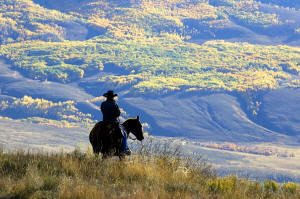Trump administration plans to rescind rule blocking logging on national
forest lands
[June 24, 2025]
By MORGAN LEE and BECKY BOHRER
SANTA FE, N.M. (AP) — The Trump administration plans to rescind a nearly
quarter-century-old rule that blocked logging on national forest lands,
Agriculture Secretary Brooke Rollins announced Monday.
The roadless rule adopted in the last days of Bill Clinton's presidency
in 2001 long has chafed Republican lawmakers, especially in the West
where national forests sprawl across vast, mountainous terrain and the
logging industry has waned.
The rule impeded road construction and “responsible timber production”
that would have helped reduce the risk of major wildfires, Rollins said
at the annual meeting of the Western Governors Association.
“This move opens a new era of consistency and sustainability for our
nation’s forests," Rollins said.
Scientists say that worsening wildfires are driven by a combination of
climate change that warms and dries out forests, less logging and
decades of fire suppression that has allowed fuels to build up.
The roadless rule has affected 30% of national forest lands nationwide,
or about 59 million acres (24 million hectares), according to the U.S.
Department of Agriculture, the agency over the Forest Service.
State roadless-area rules in Idaho and Colorado supersede the boundaries
of the 2001 roadless rule, according to the USDA, meaning not all
national forest land would be affected by a rescission.
Rollins' announcement Monday was a first step in a process to rescind
the roadless rule to be followed by a formal notice in coming weeks, the
Agriculture Department said in a statement.

The announcement comes amid recent talk of selling off federal lands in
part to improve housing affordability, an idea criticized by Democrats
as a public land grab.
Selling public lands drew a mixed reception from governors at the same
meeting. They expressed enthusiasm for economic development and worries
about curtailing public access to shared lands.
Speaking to a panel of governors and hotel-ballroom audience, Department
of Interior Secretary Doug Burgum described a new “era of abundance” on
public lands under President Donald Trump's administration in the
development of natural resources including energy and critical minerals
needed for domestic production of cellphones, computers and vehicles.
Outside the hotel entrance in downtown Santa Fe, several hundred
protesters filled the street to denounce efforts that might privatize
federal public lands, chanting “not for sale" and carrying signs that
read, “This land belongs to you and me” and “keep our public land free
for future generations.”
[to top of second column]
|

Wrangler Doug Washburn, of Crested Butte, Colo. overlooks aspen
trees with their autumn colors, near Jacks Cabin in the Slate River
Valley near Crested Butte, Colo. while gathering the Spann cattle
from the U.S. National Forest lands, Oct. 5, 2007. (AP Photo/Nathan
Bilow, File)

On social media, Alaska Gov. Mike Dunleavy, a Trump ally, called the
reversal on roadless areas “another example of President Trump
fulfilling his campaign promise to open up resources for responsible
development.”
The roadless area change meanwhile marks a sharp turnaround from the
Biden administration, which far from opening up more areas to timber
harvesting sought to do more to restrict logging and protect
old-growth forests.
Environmental groups, who want to keep restrictions on logging and
road-building for places such as Alaska's Tongass National Forest,
criticized the possibility of rolling back the protections.
“Any attempt to revoke it is an attack on the air and water we
breathe and drink, abundant recreational opportunities which
millions of people enjoy each year, havens for wildlife and critical
buffers for communities threatened by increasingly severe wildfire
seasons,” Josh Hicks, conservation campaigns director at The
Wilderness Society, said in a statement on the USDA’s plans.
Contrary to what Rollins said about reducing wildfire risk, logging
exacerbates climate change and makes wildfires more intense, said
Center for Western Priorities political director Rachael Hamby.
“This is nothing more than a massive giveaway to timber companies at
the expense of every American and the forests that belong to all of
us,” Hamby said in a statement.
In Alaska, home to the country's largest national forest, the
Tongass, the roadless rule has long been a focus of litigation, with
state political leaders supporting an exemption to the rule that
they argue impedes economic opportunities.
During the latter part of Trump’s first term, the federal government
lifted restrictions on logging and road-building in the Tongass,
something the Biden administration later reversed.
Trump in January called for reverting to the policy from his first
term as part of an Alaska-specific executive order aimed at boosting
oil and gas development, mining and logging in the state.
The Tongass is a temperate rainforest of glaciers and rugged coastal
islands. It provides habitat to wildlife such as bears, wolves,
salmon and bald eagles.
___
Bohrer reported from Juneau, Alaska. Mead Gruver in Cheyenne,
Wyoming, Matthew Daly in Washington, D.C., and Matthew Brown in
Helena, Montana, contributed to this report.
All contents © copyright 2025 Associated Press. All rights reserved |